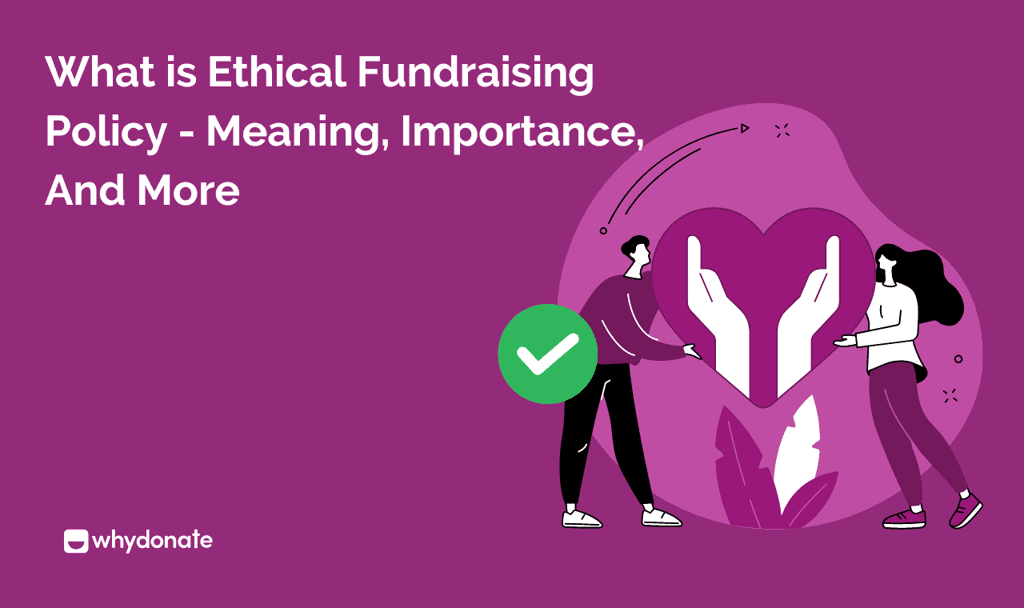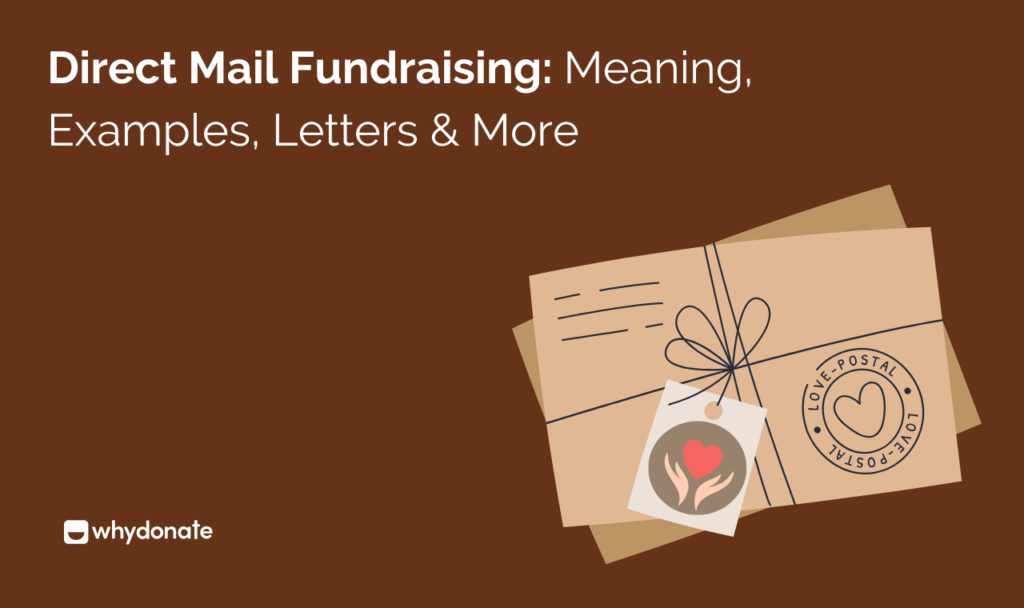In every organization, moral values and principles play a significant role. Ethical fundraising is the process that tells us that everyone involved in the fundraising process must adhere to several guidelines or norms that allow everyone to work in an organized and professional manner. Ethical fundraising involves many other things, such as its importance, ethics, and the writing of an ethical fundraising policy, which we will study in this informative writing. So make sure you read it by the end and get all the information about ethical fundraising.
Want to build trust through transparency? Start a Fundraiser the Ethical Way.
Table of Contents
What Is Ethical Fundraising?
Conducting fundraising activities transparently, accountably, and responsibly and respecting the rights and dignity of donors and beneficiaries is an integral part of the fundraising process. It is vital to effectively and efficiently use the funds to fulfill the organization’s objective.
These practices are referred to as Ethical Fundraising. Moreover, avoiding misleading or coercive tactics, maintaining donor confidentiality, and complying with relevant laws and regulations are significant in Ethical Fundraising.
What Are Ethical Fundraising Guidelines?
Ethical fundraising guidelines are a set of instructions that every organization must follow. These ethical fundraising guidelines allow the organization to work smoothly and professionally, avoiding future hindrances. These approaches help ensure that fundraising activities are conducted with integrity, respect for donors and beneficiaries, and a focus on achieving the intended social or charitable impact. Let us have a look at these guidelines:
- Transparency: Give detailed information about the organization, its goals, and how funds will be used.
- Accountability: Establishing systems to monitor and report on the use of money will ensure that they are utilized in a way consistent with the intentions of donors and organizational goals.
- Donor Loyalty And Respect: Respect the privacy and choices of donors, including their right to information, a sincere apology, and proper acknowledgment.
- Avoidance Of Coercion: Avoid coercion by avoiding pressuring people into making donations by using harsh or coercive methods.
- Conflict Of Interest: Be honest about any possible matches affecting how money is raised or used.
- Donor Confidentiality: Maintain donor data’s privacy by ensuring it is only used for those purposes and never disclosed without permission.
- Compliance: All the applicable laws and regulations related to fundraising must be followed. Industry best practices for fundraising, financial management, and data protection must be addressed.
- Responsible Spending: Excessive or wasteful expenditures must be avoided to achieve the organization’s mission.
- Impact Reporting: All the donors must be aware of the impacts and outcomes of their fundraising efforts. They deserve to get regular updates on the same.
- Ethical Partnerships: Establish partnerships with other organizations and individuals with similar moral values and principles.

How WhyDonate Adheres To All The Ethical Fundraising Guidelines?
WhyDonate is the largest and the most reputed European Fundraising Platform. The platform adheres to ethical fundraising guidelines’ norms, and morals. WhyDonate organization believes in being transparent to donors and campaigners. The goals and objectives of the organization, where the funds will be used, are communicated to those willing to join us. We adhere to all the applicable laws and regulations and follow the best fundraising practices.
Donor respect and privacy are among our top priorities; that is why all the information is kept confidential and never disclosed without the knowledge of the donor/campaigners. We avoid coercion, and everyone can donate as much as they wish.
Why Is Ethical Fundraising Important?
When ethical fundraising practices are brought into action, there are several advantages that an organization and the people associated with it enjoy. Let us have a look at them.
1. Trust Building
When organizations build good relationships with donors, trust, and understanding are developed. When these ethical standards are kept in mind, donors are more likely to feel confident that their contributions will be used appropriately and for the intended purposes.
2. Provides Donor Satisfaction
A sense of satisfaction is developed when the organizations follow all the ethical fundraising practices. We all know how crucial the donor is in an organization, which is why all organizations must know about ethical fundraising.
3. Legal Compliance
Adhering to all the applicable laws, regulations, and guidelines is very important for all the organizations involved in fundraising. Ethical fundraising also means that these rules and regulations are not violated, and activities are conducted legally, transparently, and accountable.
4. Long-Term Sustainability
When organizations follow ethical fundraising practices, the organization will probably live longer. As there is a lot more donor retention and it contributes to other benefits, there will be a higher chance of long-term sustainability for the organization.
5. Builds a Positive Reputation
When all the rules are followed, donors are respected, and trust has been built, an organization tends to have a better reputation. When organizations adhere to ethical fundraising practices, donors feel more confident supporting them.
What Are Fundraising Code Of Ethics?
The fundraising code of ethics refers to an organization’s morals and principles. These ethical fundraising practices ensure that the procedures are followed transparently and fairly. Let us now have a look at some ethics that govern fundraising.
Ready to fundraise with integrity? Start a Fundraiser with WhyDonate.
1. Honesty
Donors play a vital role in the fundraising process. The organization must ensure that all the procedures are transparent and be honest with everyone involved at every fundraising stage.
2. Rights of the Donor
Decision-making and privacy are some of the many rights of a donor. They must not be forced to do anything and must be respected for every right they own.
3. Legal Compliance
Fundraising ethics also means following all the applicable laws, rules, and regulations. By adhering to all the laws, the organization can expect long-term sustainability and the trust of everyone involved.
4. Using Funds Responsibly
The funds given by the supporters must be used wisely. They must not get wasted or used elsewhere without the giver’s knowledge.
5. Diversity and Inclusivity
Fundraisers should promote diversity, equity, and inclusion in their practices, ensuring that fundraising efforts are accessible and inclusive to all individuals and communities.
6. Professionalism
Every organization should work professionally and thoughtfully. Fundraisers should strive for high professional standards, continually improving their skills and knowledge in ethical fundraising practices.
7. Accountability and Transparency
A strong ethical fundraising approach requires clear communication about how funds are raised, allocated, and used. An ethical fundraising policy should be in place to uphold integrity and trust. Following the fundraising professionals code of ethics, organizations must report outcomes honestly and be open to feedback from stakeholders and donors.

How Do You Write An Ethical Fundraising Policy
Ethical fundraising policy has its significance. It plays a vital role in the functioning of the work environment and tells the donors and campaigners about your company’s norms. Writing an ethical fundraising policy might not be a piece of cake for many people; that is why we have noted these steps that you can follow to write an accurate, ethical fundraising policy.
1. Establish Your Company’s Values
Start by defining the fundamental values and principles of your company’s vision and mission. These values will form the base of your ethical fundraising policy.
2. Study And Review Relevant Regulations And Guidelines
Learn about the regulatory and legal requirements for fundraising in your country. This includes knowing the laws of solicitation for donations, privacy, data security, and financial reporting.
3. Find Out The Scope And Reason For Your Campaign
Clarify the scope and goal that your fundraising policies serve. Define the fundraising events it covers, such as private donations or corporate sponsorships, special grants, and other events.
4. Examine The Key Ethical Concerns
Examine ethical concerns specifically related to fundraising, like transparency, the privacy of donors, conflicts of interest, ethical use of funds, diversity, and inclusion. Establish policies and procedures that take into account all of these issues.
5. Outline Donors’ Rights And Responsibilities
Clearly define donors’ rights and duties, ensuring they are informed in their decisions and protecting their privacy. The processing of their personal information. Give guidelines on how to deal with complaints or concerns.
6. Set Guidelines For Financial Management
Establish how the funds are allocated and managed to ensure transparency, accountability, and ethical utilization of donations. Set out the procedures to report on financials, auditing, and providing accurate reporting of the fundraising expenses.
7. Be Aware Of Conflicts Of Interest
Set guidelines to recognize and address conflicts of interest between board members, staff, and volunteers involved in fundraising. Set out guidelines for disclosure, recusal, and the decision-making process.
8. Incorporate Considerations For Diversity And Inclusion
Include considerations for equity, diversity, and inclusion in your fundraising methods. Create policies to guarantee that your fundraising is inclusive and accessible for people of different backgrounds and communities.
9. Communicate The Policy
Once established, ensure it is communicated to all stakeholders, including volunteers, board members, and donors. It should be easily accessible through your website. You can also offer training or orientation sessions to ensure compliance and understanding.
10. Review And Regularly Update Policies
The policy for fundraising procedures and regulations changes as time passes, and it is essential to regularly examine and revise your policy to ensure that it is relevant and in line with the most effective practices.
The Final Word
So now you completely understand ethical fundraising and ethical fundraising guidelines. By understanding the fundraising code of ethics, you can make your organization a fairer and more competitive place to implement good fundraising practices. Ethical fundraising is essential in many ways, as covered in this informative writing.
Since WhyDonate is the largest European fundraising platform, it is vital for us to follow these ethical fundraising guidelines. We believe everyone connected to our organization must be respected, and all laws must be followed accordingly. We hope this blog brought insights into ethical fundraising policy and everything around it.
Join thousands fundraising responsibly. Start a Fundraiser on WhyDonate.
FAQs
1. What is ethical fundraising and why is it important?
Ethical fundraising is the practice of collecting donations with honesty, transparency, and respect for donors and beneficiaries. It is important because it helps build trust, ensures legal compliance, and maintains a positive reputation for the organization.
2. How does a fundraising professionals code of ethics guide nonprofit behavior?
The fundraising professionals code of ethics provides clear principles like honesty, accountability, and respect for donor rights. It ensures fundraisers maintain high standards and act in the best interest of both donors and the cause.
3. What should an ethical fundraising policy include?
An ethical fundraising policy should include the organization’s values, compliance with legal regulations, financial management guidelines, conflict of interest policies, and commitments to diversity, inclusion, and donor confidentiality.
4. How do fundraising ethics affect donor relationships?
Fundraising ethics strengthen donor relationships by ensuring transparency, avoiding coercion, and respecting donor privacy. When donors feel valued and respected, they are more likely to give again and support long-term.
5. Why should every nonprofit implement an ethical fundraising policy?
Having an ethical fundraising policy ensures that all fundraising activities align with legal, moral, and professional standards. It safeguards donor trust, promotes responsible behavior, and supports the sustainability of the nonprofit’s mission.

















